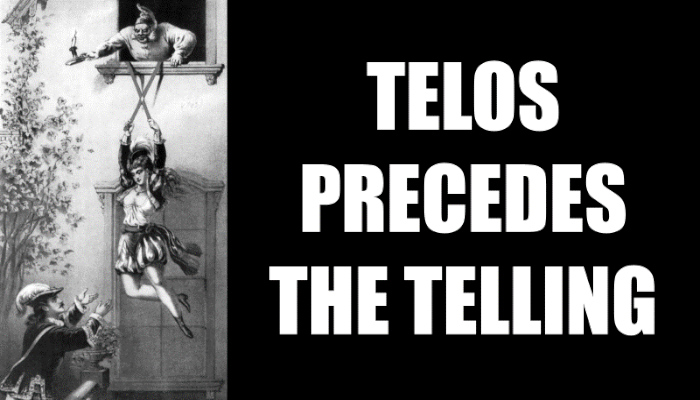
Studying words from other languages is useful because they often capture a meaning that may not translate directly into one’s native tongue. Today’s example comes from the Greek word telos, which loosely translates to goal or end, but more accurately embodies the concept of the ultimate goal or the ultimate end.
According to Aristotle, telos resides in everything animal, vegetable, or mineral, and somehow, each one works in concert. While a rabbit’s telos may be to survive, it can only do so through a complementary collection of internal telos, like remaining safe, finding food, and reproducing. And although the telos of vegetables and minerals may not involve bunny-consciousness, they each play a role in feeding the rabbit’s hunger and forming a cave for the rabbit’s family to live in.
Let’s take a look at the role of telos in communicating. You’ve been tasked with presenting the results of your most recent project. So, what’s your telos? By the time you thank your audience for their time, what do you want them to walk away with? Is it to look at an issue from another perspective, change the way they’re doing things, or encourage them to double down on a controversial action because it’s the right thing to do?
Unfortunately, most people skip the telos step, preferring to jump right into the recitation of fact after tactical fact. Sadly, the telos of most presentations is to “get it out of the way” instead of conveying a subject’s deeper meaning.
For example, I recently found myself in the audience of a dreadful business presentation. When the presenter noticed that he’d completed his talk fifteen minutes ahead of his one-hour time slot, he said, “Wow! I thought I had too many slides!” Obviously his telos wasn’t to communicate, but to create enough slides to fill the time allotted.
To be fair, telos-driven talks require work that most people don’t think that they have the time to invest. But in reality, every presentation is a pay-telos-now-or-pay-telos-later situation. The less telos pre-work presenters put into their presentations, the more audiences must asses their own telos by asking internal questions such as:
- How does this information apply to me?
- Why am I sitting here?
- When is catering restocking that refreshments table?
Storytelling telos plays a fundamental role in my various interactions with people:
- The telos of my lectures is to teach a certain message.
- The telos of my opening stories is to bond with my audience.
- The telos of a story told over a pint of beer is usually to entertain.
- The telos of a Griddlecakes Radio story is to convey a life-lesson that a specific experience taught me.
Before you present, ask yourself, What’s my telos? Is it to add moisture to a dry subject, such as was my telos for writing The Proverb Effect? Is it to add personality to data, change a perspective, or to bond over a common experience?
Whichever way you choose, telos-driven communications strategies also contain a built-in quality control mechanism. When used, you’ll always be able to look back on a presentation and determine whether you were successful or not.
Image Credit: Metallic End Suspenders. , ca. 1874. Photograph. https://www.loc.gov/item/2001701469/.